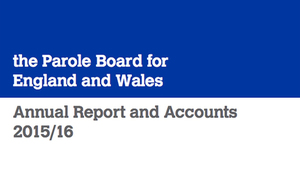Parole Board annual report and accounts for 2015/16: steady progress but more to do
The Parole Board has today published its Annual Report and Accounts for 2015/16.

The Parole Board has today published its Annual Report and Accounts for 2015/16 which records the work carried out by the Board last year to achieve its aims of making risk assessments that are rigorous, fair and timely while protecting the public and contributing to the rehabilitation of prisoners.
The Board is making steady progress in reducing its backlog and in dealing with prisoners given indeterminate sentences for public protection while maintaining a focus on public safety but there is more to do.
Professor Nick Hardwick, the new Chair of the Parole Board said:
Under the leadership of my predecessor, Sir David Calvert-Smith, the Parole Board made good progress in reducing its backlog and progressing the concerning number of IPP prisoners who remain in prison despite the sentence being abolished. This progress was made despite an increase in the Board’s workload and limitations on its resources. With the hard work of members and staff and the support of new Ministers and other partners, we will now build on what has been achieved to make further significant progress while ensuring we keep a very clear focus on public safety.
The previous year focused on ensuring the Board responded to the changes and needs of its business, which involved a wide range of reviews of processes and practices and challenged ourselves to look at every aspect of our work. Subsequently, 2015/16 concentrated on embedding those new ways of working already implemented and delivering advances and enhancements to ensure we continuously improved systems and processes.
The Board particularly looked to work in collaboration with other organisations involved in parole work to find shared solutions to some of the challenges within the system. The Board made steady progress in 2015-16 in reducing the number of outstanding cases, but is looking to make further progress next year.
During the year the Board saw a number of significant changes in management, including the appointment of a new Chief Executive Officer and two Directors. At the end of the reporting period, Sir David Calvert-Smith was replaced as chair by Professor Nick Hardwick.
One of the first initiatives introduced by the new CEO, Martin Jones was the development of an 18-month plan which provided a framework to deliver against and to identify priorities and pinpoint where to focus resources.
Statistics
The key statistics for 2015/16 are:
23,852
The total number of hearings conducted during the year. This is compared with 24,385 during 2014/15. There were less paper hearings undertaken during the year, however more oral hearings did take place.
2,445
The number of outstanding cases at the end of the year compared with 2938 at the end of 2014/15, a fall of 17%
7,148
The number of oral hearings that took place during the year. This compared with 6,872 the previous year (2014/15) and 4,216 five years ago (2011/12).
35%
The percentage of paper hearings that directed the prisoner to an oral hearing. This is a slight decrease from 36% in 2014/15.
59%
The percentage of prisoners progressing at the oral hearing stage, which is down on last year (64%).
38%
The percentage of IPP prisoners released following an oral hearing. 6 years ago the release rate was 12%. The Parole Board released 746 IPPs following an oral hearing in 2015-16, more than it has ever released.
£14.2m
The Parole Board budget for 2015/16.
117
The average number of staff employed during the year.
Notes to Editors
The Parole Board is an independent body that works with its criminal justice partners to protect the public by risk assessing prisoners to decide whether they can safely be released into the community. The Board has responsibility for considering life sentence prisoners (mandatory life, discretionary life and automatic life sentence prisoners and Her Majesty’s Pleasure detainees; and prisoners given indeterminate sentences for public protection); and determinate sentence cases (discretionary conditional release prisoners serving more than 4 years whose offence was committed before 4 April 2005; prisoners given extended sentences for public protection for offences committed on or after 4 April 2005; and prisoners given an Extended Determinate Sentence after 3 December 2012).
The Board considers initial release into the community and re-release following a recall to prison.
For further information please contact Glenn Gathercole, Business Development Directorate on 020 3334 4392 during office hours, or 07725 927 954 out of hours, or email: [email protected]